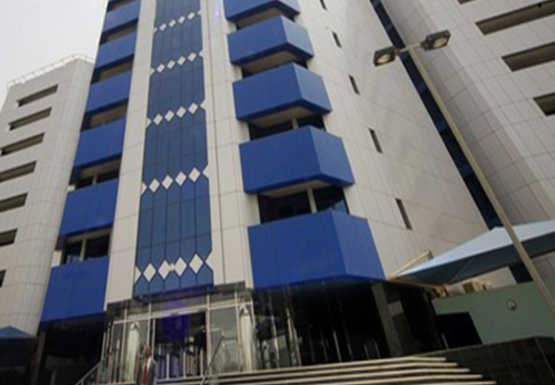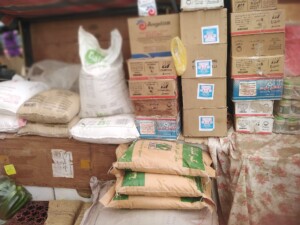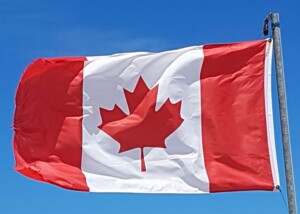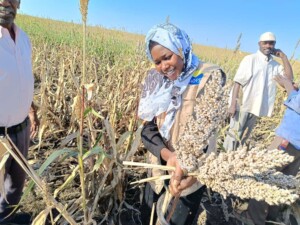Sudanese Pound continues its rapid decline, banks expected to collapse

The Central Bank of Sudan in Khartoum (File photo: CBoS)
The Sudanese Pound is continuing its accelerated decline against the foreign currencies since the beginning of this week. Economists expect the imminent collapse of about 25 banks in the country.
Foreign exchange dealers informed Radio Dabanga that the exchange rate of the US Dollar against the pound in the parallel market reached SDG1,750 yesterday, marking an increase of more than SDG450 from the previous week, a rise of 36 per cent.
The dollar’s exchange rate in commercial banks reached SDG1,260, a difference of approximately SDG500 from the parallel market.
The persisting continuing depreciation of the pound has caused and still is causing the suspension of wholesale transactions in several Sudanese states, and soaring gas and fuel prices. The authorities in Kassala in eastern Sudan announced an increase the prices of petrol, to SDG2,027, and diesel, to SDG1,920 on Wednesday.
The economic committee of the Khartoum state’s High Committee for Emergency and Crisis Management on Monday set the official price of a cooking gas cylinder of 12.5 kg at SDG23,600. It attributed the rise in the prices of imported cooking gas to the surge in the dollar’s value.
Imports
Economic reporter Ahmed Omar attributes the successive spikes in the dollar exchange rate to both the capital flight by investors and the government’s reliance on the parallel market to procure weaponry, war equipment, government inputs, fuel, imports of agricultural requirements, and attempts to bridge the gaps in wheat supplies.
“The commercial banks fail to control the exchange rate, making the parallel market the primary source of foreign currency,” he told Radio Dabanga yesterday.
“The collapse of the banking sector after the war has had a significant impact on the pound’s value, with banks losing over 50 per cent of their transaction capacity.
“Before the war [erupted in mid-April last year], the exchange rate of the US greenback was SDG650. The SDG200,000 salary of a civil servant was equivalent to $352 before the war but has now plummeted to $117,” he explained.
The analyst expects the decision of the Sudanese Ministry of Finance in January to raise the separate dollar rate on customs to rise to SDG950 next week. “This will further lead to price hikes in medicine, fuel, and all other imported goods, while there are already widespread shortages. Most of the people have seen their purchasing power crumbling and are struggling to afford the necessities of life.”
Radio Dabanga reported in February that traders of the other export product that is still continuing, livestock, sharply criticised the finance ministry and customs authorities for imposing customs duties on livestock exports.
‘Relatively stable’
According to prominent economist Hamid Eltigani, the Sudanese currency is relatively more stable compared to countries experiencing similar conflicts. “The national currency lost around 50 per cent of its value and could of course depreciate further amidst ongoing uncertainties. Currency stability, he argues, can only happen if the Rapid Support Forces (RSF) swiftly withdraws from the production areas in the country.”
Regarding future scenarios, Eltigani believes that the government’s options for addressing the exchange rate crisis amidst ongoing conflict are limited and must focus on providing relief.
The gold revenues from the so-called safe areas in eastern and northern Sudan constitute the primary resource for the Sudanese de facto government, much of which is allocated to the military budget, he told Radio Dabanga, and warned of “the potentially complete loss of control over foreign currencies. Only cessation of hostilities as a prerequisite for stabilising the economy.”
The economist noted that banks in Sudan, such as the Bank of Khartoum, the Omdurman National Bank, the Faisal Islamic Bank, the Al Salam Bank, and the Al Baraka Bank, currently rely on remittances from abroad.
He expects the imminent collapse of about 25 banks that are solely involved in withdrawal and deposit services. “Customers have abandoned them due to liquidity constraints”.
Furthermore, the widespread adoption of electronic banking applications, notably Bankak of the Bank of Khartoum, O-Cash of the Omdurman National Bank, and Fawry of the Faisal Islamic Bank, “reflects the people’s reliance on digital platforms amid currency devaluation and rising prices, rendering large banknotes impractical.
“Bankak may become dominant in electronic transfers and trade operations, particularly given the severe liquidity shortages,” Eltigani predicted.
‘Wartime’
Finance Minister Jibril Ibrahim said in a press statement on Wednesday that the Sudanese Pound’s depreciation against the dollar is typical in wartime conditions, “where the state lacks effectiveness and external resources dwindle”.
He attributed the heightened demand for the dollar and the danger of ‘dollarisation of the Sudanese economy’ to revenue deficits, stating: “Despite our efforts to halt this depreciation, as long as there is high demand for the dollar, whether for strategic imports, essential goods, or military supplies, currency erosion is inevitable.”











 and then
and then